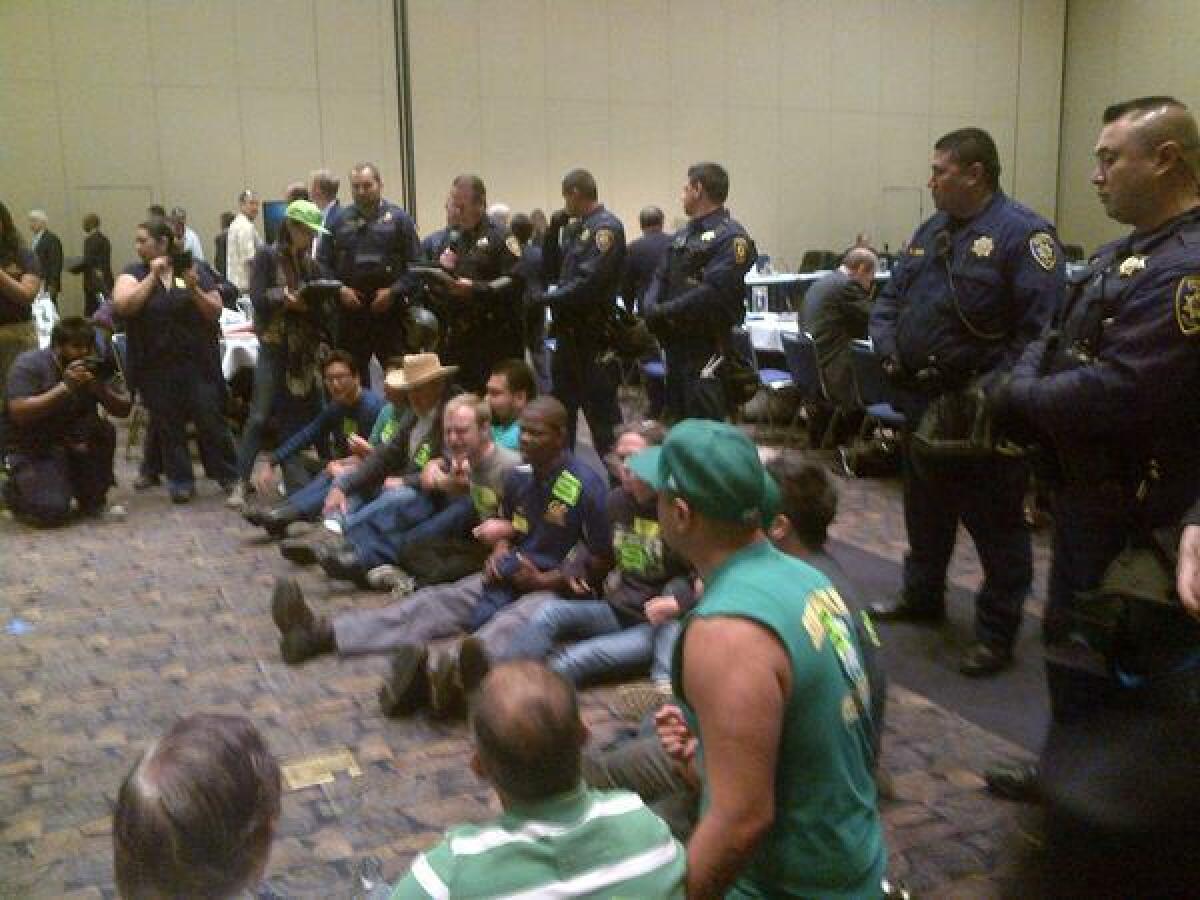Jerry Brown urges UC to stress graduating students in 4 years

- Share via
SACRAMENTO — The graduation rates of UC students came under more scrutiny Wednesday as Gov. Jerry Brown urged administrators and faculty to prod more undergraduates to earn a degree in four years, not six.
Brown recently proposed giving UC and Cal State more funds if they increase their graduation rates by 10% by 2017. UC leaders have said that is an admirable but unreasonable goal and that such issues as students’ outside employment and their desire to take double majors slow them down.
The rates have improved in recent years, partly due to higher tuition pressuring students to finish on time, officials said at a UC regents meeting in Sacramento. About 60% of UC students who enter as freshmen now graduate in four years and about 83% in six years, according to a report from UC system Provost Aimee Dorr. Those are significantly better numbers than other public research universities but worse than top private campuses, she said.
Brown, who attended part of the regents’ meeting, expressed exasperation with Dorr’s many statistics, what he implied was her lack of solid solutions and her lecture-like presentation. “This was a good first semester,” Brown said, with a touch of anti-academic humor. “But I want to get to the second semester” for answers.
He urged UC to stop citing the six-year rate, which is widely used by the federal government and other schools. “For me the four year is the norm,” he said. And he asked UC to examine why various UC campuses have better rates than others and why a number show improvements in some years and not in others. He said he wanted to know if that might be caused by factors within UC or “in the outside world.”
Brown also wants UC to explore whether faculty teach enough undergraduate courses, among other issues. UC leaders say they might reduce the number of requirements for some majors and bolster summer school offerings and counseling.
Some low-income students may need more time to finish college since they come from weaker high schools or from families with no college experience to guide them, administrators said. UC officials noted, for example, that about 40% of UC undergraduates are eligible for federal Pell grants, which typically go to families earning less than $50,000 a year. At other top public research schools, that number is only about 28%. Some regents expressed fears that low-income students might be excluded from UC if future funding depends too much on graduation speeds.
Earlier, in a kind of valedictory report as his five years in office nears an end, UC President Mark G. Yudof described the 10-campus UC system as emerging from recession with its high academic prestige intact. But he warned that it needed to figure out ways to lower costs. He intends to leave his UC post in August and a search is underway for his successor.
His summary, in a “State of the University of California” report, came as UC faces labor and budget challenges.
Technical health workers at the five UC medical centers are threatening a two-day strike next week, and a group of them disrupted the start of the regents’ meeting Wednesday with a sit-down protest that led to 13 arrests. UC also faces tough talks with legislators and the governor as it seeks more money for pension costs and to avoid raising tuition for some professional schools like law and medicine.
Yudof defended UC policies and reforms that he said made the system more efficient and more transparent. He emphasized how rare it is for a university to carry out so much world-class research while educating so many low-income students. However, he cautioned that UC needs “a more cost effective delivery model that will preserve our quality,” a future that depends more on online education and other changes. He promised more details at the July meeting.
The detained union activists were charged with unlawful assembly during the peaceful, 20-minute demonstration. The UC regents left during the sit-in and UC police cleared the room, handcuffing the protesters and leading them out of the Sacramento Convention Center. Among those cited for the misdemeanor was Kathryn Lybarger, president of AFSCME 3299, the union that represents about 13,000 patient care technical workers.
That union voted to authorize a strike on May 21 and 22. But UC said it was seeking an injunction to forbid the walkout, saying it would imperil patients and cause surgeries to be delayed.
One of the sticking points is UC’s new two-tiered pension plan that makes changes for new hires and requires all employees to pay more for pension costs, points agreed to by other bargaining units in UC. The union contends the system is cutting back staff dangerously while hiking pay for hospital executives.
More to Read
Sign up for Essential California
The most important California stories and recommendations in your inbox every morning.
You may occasionally receive promotional content from the Los Angeles Times.










